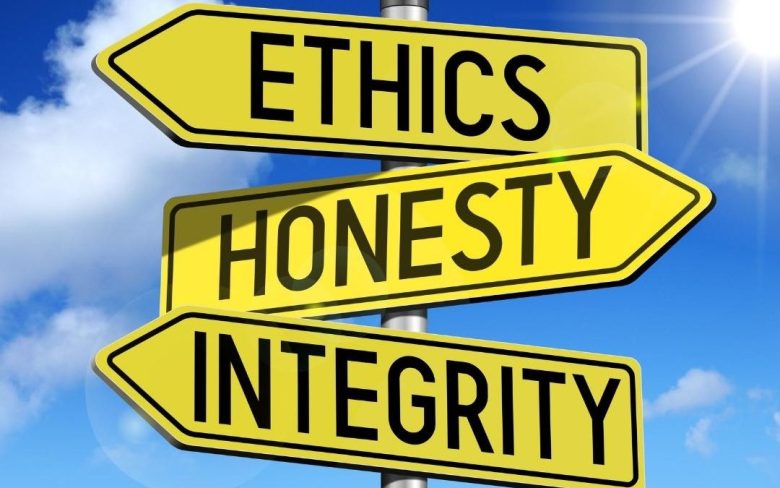Workplace ethics involve being held responsible for one’s actions, acting openly, and upholding your values—aits that can be fostered through creating an inclusive company culture and employing effective leadership practices. Kouchaki and Isaac Smith assert that it’s vitally important for managers to provide ethical training that goes beyond simply outlining ethical dos and don’ts; such a course should include how to respond appropriately when ethical lapses occur in a way that encourages learning.
1. Honesty
Honesty is an essential virtue that requires you to always speak the truth, no matter the situation or outcome. Being honest means not hiding facts for personal gain and abstaining from actions that compromise what you consider morally right.
For example, if an employee observes another worker manipulating financial data to meet sales quotas, they should notify either their manager or one of the company’s ethical reporting channels immediately in order to prevent unethical practices from becoming normalized within their workplace. Doing this may help ensure unethical practices do not become normalized over time and become widespread within an organization. An ethical workplace encourages its employees to act in an honest and truthful manner with each other and allows for diverse perspectives and innovative ideas to flourish in an atmosphere conducive to productivity.
2. Accountability
Accountability refers to taking responsibility for our actions. This could involve cleaning up after yourself when there’s a spill or taking time out to listen and address concerns from coworkers.
Organizations can foster an accountable culture by offering training on recognizing ethical behavior and creating anonymous channels to report any unethical practices without fear of reprisals from management. Furthermore, managers should lead by example and engage in open communications with employees in order to foster an environment of integrity amongst employees.
3. Transparency
Employees need a safe way to report unethical behaviors without fear of reprisals from management, whether this means internally through anonymous reporting systems or an internal suggestion box monitored by an independent third party. Furthermore, effective leadership that promotes transparency and accountability is also crucial.
This can include being honest about project delays or taking ownership for mistakes rather than shifting blame. Furthermore, regularly training sessions on diversity and inclusion are an excellent way to demonstrate that everyone in the organization is valued; doing so helps build trust while creating an atmosphere of integrity within your workplace.
4. Collaboration
An effective way of encouraging collaboration in any company is through encouraging and rewarding employees who exhibit strong work ethics; eethics;this could include encouraging open discussions, a transparent workplace culture, and suggestion boxes as a method.
Integrity goes beyond being honest and respecting others; it means adhering to defined moral principles and being proactive. For example, when taking on additional projects, being honest about your abilities while setting clear expectations are examples of working with integrity. Leaders must set an example for workplace integrity by being transparent in indecision- making, accepting responsibility for errors made, and being consistent in both words and actions.
5. Inclusion
An effective culture of integrity starts at the top, which means ensuring leaders adhere to ethical standards and address toxic behavior through regular feedback systems and trainings on what it means to lead in an ethical manner.
Inclusion refers to how individuals of various identities feel valued, respected, and included within an environment. It involves addressing specific cultural differences that exist in the workplace—for instance, providing meeting materials ahead of time to those speaking English as their second language or rotating meeting times to accommodate work-from-home employees with nontraditional schedules.
6. Respect
No organization can maintain a culture of integrity without teaching their employees about expectations. Integrity must be taught, which falls squarely within management’s purview. Employees should be provided with education on how to recognize ethical dilemmas and understand the repercussions of their choices, while encouraging them to reach out if they need advice regarding an ethical situation.
Establish a culture of respect through encouraging communication and collaboration among employees. Employees who feel respected are less likely to steal time, saving the company thousands every year in lost productivity costs.
7. Accountability
Establishing a culture of accountability involves consistent enforcement of ethical standards. Employees are then motivated to work hard in an effort to earn trust from their colleagues and gain recognition amongst peers, thus helping lower risks, avoid legal complications, and increase talent recruitment efforts.
Managers should model integrity themselves to set an example for their teams. In addition, they must encourage open discussions and an honest work culture in order to encourage good behavior from employees. They may consider introducing mechanisms that enable employees to voice concerns without fear of ofreprisals,; such as town hall meetings, team discussions, or open door policies.
8. Collaboration
Collaboration among team members from diverse backgrounds and experiences promotes an inclusive culture. Doing so encourages employees to consider others’ perspectives when making decisions, leading to more ethical and effective work practices. Companies can promote moral behavior among employees by communicating their ethical values at regular intervals and offering guidance for resolving ethical dilemmas, while creating channels through which employees can report unethical practices.
Companies should also recognize ethical behavior through incentives like bonus payments or additional days off work. This can motivate team members and demonstrate company leadership’s dedication to cultivating an atmosphere of integrity within the workplace.
9. Integrity
Workplace integrity involves adhering to a set of moral values and principles, including treating others with respect, being honest in communications with customers or coworkers, reporting any unethical conduct as soon as it arises, and reporting illegal actions when necessary.
Businesses with strong ethics tend to enjoy better reputations and attract more job applicants and customers. Furthermore, such organizations tend to foster an environment that encourages collaboration and loyalty to their mission. However, even small breaches in ethics can compromise a company’s integrity. Leaders are responsible for setting high ethical standards in daily operations as an example to their employees, while teaching them how to recognize ethical gray areas and take corrective actions when necessary.




